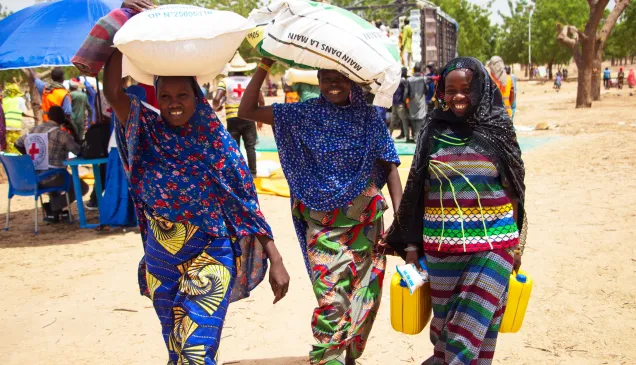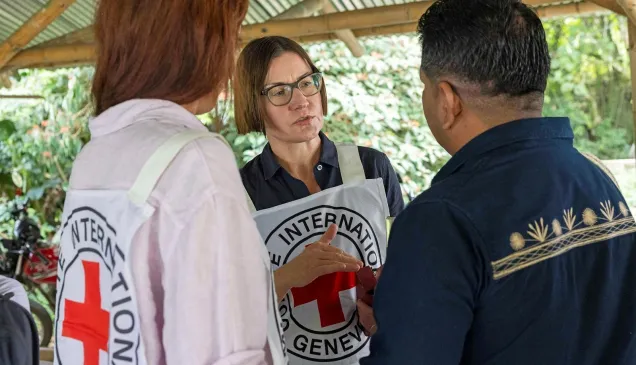Address by the ICRC President Peter Maurer to the 43rd session of the Human Rights Council, 24 February 2020, Geneva.
During my visits this year to Libya, Somalia and Ethiopia, people told me of their distress over deadly shelling, sexual abuses, brutal droughts and floods. Against the tide of progress, they fear their children and grandchildren will suffer greater hardship and insecurity.
Climate shocks, pandemics, crime, politically-motivated violence, insecurity and inequality are entrenching the impacts of war.
The arms trade booms with profit prioritised over human life.
Powerful explosive weapons are deployed in urban areas with little regard for humanitarian impacts.
Protections are wound back in the name of exceptionalist measures to 'fight terrorism'.
Humanitarian aid is targeted and politicised.
Military objectives and the politics of revenge are winning at the expense of human life and dignity.
Both those living in countries at war and at peace are fearful. A majority of millennials around the globe surveyed by the International Committee of the Red Cross predict there will be a catastrophic third world war or a nuclear attack in their lifetimes.
But it is not 'game over'. Most of those surveyed still believe, as I do, that wars are avoidable and limits on warfare must be implemented and defended.
People are asking for leadership to find solutions to these difficult issues:
- For warring parties to cease violations;
- For partners and allies to exert their influence to ensure respect for the law; and
- For States through dialogue and action, to champion rather than sacrifice, humanitarian norms and principles.
While much has been said about the effectiveness of multilateralism, I believe this is a critical moment for States, individually and collectively, to reinforce people's faith in the norms of humanity and to restore trust that their needs will be at the heart of decision-making.
Violence between warring parties is not new and the dilemmas are not insurmountable. Across centuries societies have sought to establish customary norms and rules that ensure a minimum of humanity in the worst of circumstances.
International Humanitarian Law does not propose that wars can be fought without victims, but that harm can be minimized through standards and principled action.
Today, IHL and International Human Rights Law are our universal standards of protection. As we all know, Human Rights Law is applicable in all circumstances. And IHL provides guidance through the difficult dilemmas of balancing military objectives against harm to civilians in armed conflict. Over the longer term, IHL's lasting benefit is to shape behaviours that not only prevent the worst human suffering during war, but by doing so may contribute to future reconciliation.
Even in the deadliest of conflicts the ICRC, as a neutral intermediary, sees how shared humanitarian objectives can help parties find common ground, whether through exchanges of prisoners, evacuation of the wounded, cross-line humanitarian activities, or respectful exchange of mortal remains.
These trust-building measures, made on humanitarian grounds, can lay the foundations to mend relationships between belligerents and lead eventually to stability.
Conversely when the law is applied selectively, it can fuel resentment and a return to hostilities. I fear the possible reverberating impacts when human dignity is violated: when excessive use of force is used in managing demonstrations; when torture is accepted as solution to maintain security.
Or when well-established protections are withheld on the grounds of dehumanizing certain groups of people or stigmatizing those affiliated with non-state armed groups, including fighters and their families. States must live up to their responsibilities: no one is exempt from humanity, nor beyond the law. Accountability is for violators, not for enemies.
I do not pretend that it is easy to grapple with difficult aspects of legality, respect, trust-building and accountability, in particular in contexts of war and violence. Looking at the reality of enormous suffering, we do not have a choice but need to do better – you can do better.
If the law continues to be disregarded, the consequences will be devastating not only for individuals and communities, but for the stability of entire regions and for generations.
This is the moment for States to reverse the current trajectory – to listen to their citizens, to find the necessary political will and to put human life and dignity at the centre.



